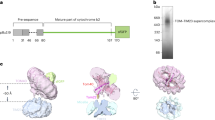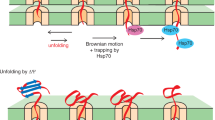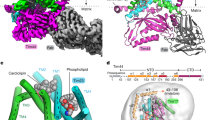Abstract
WE have reconstituted the initial steps of mitochondrial protein import with a purified precursor protein, a purified, ATP-depend-ent, cytosolic chaperone selective for mitochondrial precursors (mitochondrial import stimulating factor; MSF), and either intact mitochondria or intact or solubilized mitochondrial outer membranes. We show that the precursor–MSF complex first binds to the Mas37p/Mas70p subunits of the mitochondrial import receptor. After ATP-dependent release of MSF, the precursor is transferred from Mas37p/Mas70p to the Mas20p/Mas22p sub-units of the receptor, and finally delivered to the import channel in the outer membrane. Import in the absence of the MSF bypasses Mas37p/Mas70p. The ATP-mediated transfer of a precursor from MSF to specific subunits of the import receptor is similar to the GTP-mediated transfer of precursors from the signal recognition particle to its receptor on the endoplasmic reticulum.
This is a preview of subscription content, access via your institution
Access options
Subscribe to this journal
Receive 51 print issues and online access
$199.00 per year
only $3.90 per issue
Buy this article
- Purchase on Springer Link
- Instant access to full article PDF
Prices may be subject to local taxes which are calculated during checkout
Similar content being viewed by others
References
Hachiya, N. et al. EMBO J. 12, 1579–1586 (1993).
Hachiya, N. et al. EMBO J. 13, 5146–5154 (1994).
Kiebler, M., Becker, K., Pfanner, N. & Neupert, W. J. Membrane Biol. 135, 191–207 (1994).
Lithgow, T., Glick, B. S. & Schatz, G. Trends biochem. Sci. 20, 98–101 (1995).
Moczko, M. et al. J. biol. Chem. 269, 9045–9051 (1994).
Haucke, V., Lithgow, T., Rospert, S., Hahne, K. & Schatz, G. J. biol. Chem. 270, 5565–5570 (1995).
Hönlinger, A. et al. Molec. cell. Biol. (in the press).
Lithgow, T., Junne, T., Suda, K., Gratzer, S. & Schatz, G. Proc. natn. Acad. Sci. U.S.A. 91, 11973–11977 (1994).
Steger, H. F. et al. J. Cell Biol. 111, 2353–2363 (1990).
Wachter, C., Schatz, G. & Glick, B. S. Molec. Biol. Cell 5, 465–474 (1994).
Gratzer, S. et al. J. Cell Biol. 129, 25–34 (1995).
Ellis, R. J. & Hemmingsen, S. M. Trends biochem. Sci. 14, 339–343 (1989).
Hines, V. et al. EMBO J. 9, 3191–3200 (1990).
Ramage, L., Junne, T., Hahne, K., Lithgow, T. & Schatz, G. EMBO J. 12, 4115–4123 (1993).
Haid, A. & Suissa, M. Meth. Enzym. 96, 192–205 (1983).
Glick, B. S. et al. Cell 69, 809–822 (1992).
Hines, V. & Schatz, G. J. biol Chem. 268, 449–454 (1993).
Author information
Authors and Affiliations
Rights and permissions
About this article
Cite this article
Hachiya, N., Mihara, K., Suda, K. et al. Reconstitution of the initial steps of mitochondrial protein import. Nature 376, 705–709 (1995). https://doi.org/10.1038/376705a0
Received:
Accepted:
Issue Date:
DOI: https://doi.org/10.1038/376705a0
This article is cited by
-
Global kinome profiling reveals DYRK1A as critical activator of the human mitochondrial import machinery
Nature Communications (2021)
-
Revisiting trends on mitochondrial mega-channels for the import of proteins and nucleic acids
Journal of Bioenergetics and Biomembranes (2017)
-
Gene expression patterns in the hippocampus during the development and aging of Glud1(Glutamate Dehydrogenase 1) transgenic and wild type mice
BMC Neuroscience (2014)
-
Machinery for protein sorting and assembly in the mitochondrial outer membrane
Nature (2003)
Comments
By submitting a comment you agree to abide by our Terms and Community Guidelines. If you find something abusive or that does not comply with our terms or guidelines please flag it as inappropriate.



